With coffee shops of both international and domestic brands now occupying nearly every street corner in China's first- and second-tier cities, the market share for traditional local teahouses has shrunk over the past decade. The One Yuan Teahouse in Digang village of Huzhou, East China's Zhejiang Province, for example, is one such teahouse struggling for survival. Customers can sit in this teahouse the entire day from as early as 3 am, spending only 1 yuan ($0.16) for the cost of boiled water, a table and a chair.
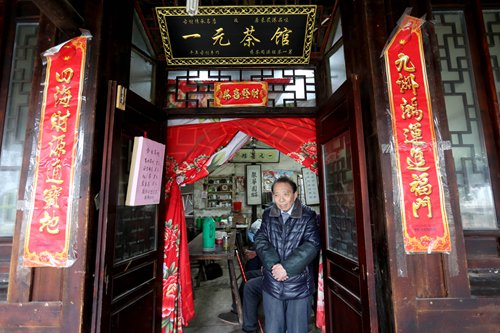
Pan Pingfu stands at the gate of his One Yuan Teahouse. Photos: Yang Hui/GT
The 1-yuan teahouse
Pan Pingfu, the owner of the One Yuan Teahouse, is also a veteran barber who based his barbershop inside the teahouse.
Seventy-six-year-old Pan inherited the teahouse in 1966, back when there were three or four teahouses in Digang, which used to be a township with water transport connecting it to Jiangsu Province and Shanghai.
The teahouse was founded by Tian Guanshu in the Qing Dynasty (1644-1911). It was passed on to Chen Aqing, then Chen Yueming. Pan is the fourth owner of this century-old teahouse.
"In its golden years, this water town had 13 teahouses, which were also venues for merchants from all over the country to meet and discuss their businesses," Pan told the Global Times.
Pan continued to say that, "silk, cloth, tea, fish and rice were the commodities being transported to and from Digang. Teahouses were the venues witnessing the prosperity of the region."
Pan's teahouse in modern times, however, has become a simple gathering point for local old people.
"Many of the seniors here are living in an 'empty nest' condition in the village. Their children work and live elsewhere, like Huzhou, Hangzhou, Jiaxing and even Shanghai. Our customers were left behind," said Pan.
"They're not used to life in big cities where they don't know others. They feel more comfortable in their hometown. They are alone, but not lonely.
"My teahouse is the place where they can meet each other; they kill time all day here. It's a habit for them. I will try to maintain this teahouse as long as I can," Pan added.
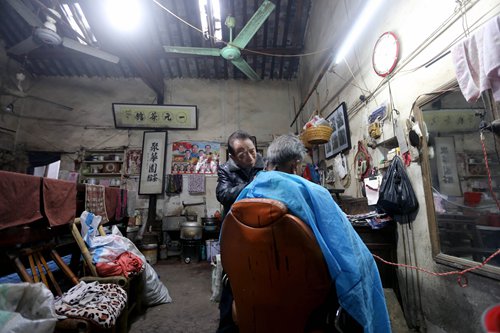
Pan Pingfu cuts a customer's hair.
Iconic landmark
Nowadays, Pan receives about 20 to 30 guests per day, compared to the previous 70 to 80 back in its heyday. Pan said that younger generations are unwilling to sit around with the old people, so there isn't a fresh supply of new faces. The harsh fact is that elderly people die every year, causing the teahouse to lose more and more loyal customers.
Pan and his teahouse have become iconic symbols of Zhejiang. There, the Global Times saw many certificates awarded by different levels of the government to the establishment.
The name "One Yuan Teahouse" was presented by a local calligraphy master who was moved by Pan's persistent efforts. Although commodity prices have increased in the past decade, Pan insists on the 1-yuan entry fee so that seniors can continue to afford it.
In his teahouse, Pan has a 66-year-old assistant, Zhang Qingsong. Zhang was born deaf, so Zhang's brother, before passing away, entrusted Pan to take care of him. Zhang has been with Pan since he was young.
"If nobody takes care of him, he could easily go in the wrong direction. I provide him with food and accommodations; he is like a family member."
The teahouse is also a designated venue for the "Learning from Lei Feng" campaign in Huzhou, where needy people can ask for help.
The Global Times witnessed an 85-year-old man approach Pan informing him that another 88-year-old man fell on the ground and couldn't stand up by himself. Pan rushed to the scene to help lift up the old man and take him somewhere comfortable.
Asked how he covers the losses of running a money-losing business, Pan told the Global Times that "the money I earn from cutting hair helps make ends meet. Otherwise this teahouse couldn't continue."
On the day the Global Times was there, Pan had seven clients, which earned him 105 yuan in total. All of his regular barber customers are from the village, but Pan said he'd be happy to receive some new visitors from Shanghai or elsewhere who might be curious about sipping some tea and having their hair trimmed at this ancient, iconic landmark.
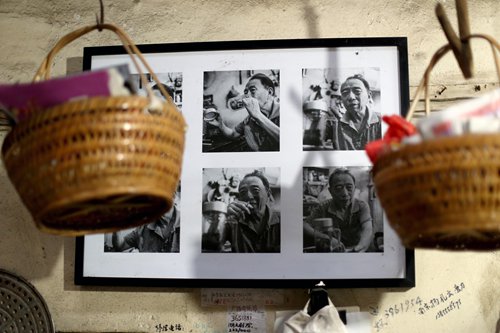
Portraits of Pan photographed by a professional photographer
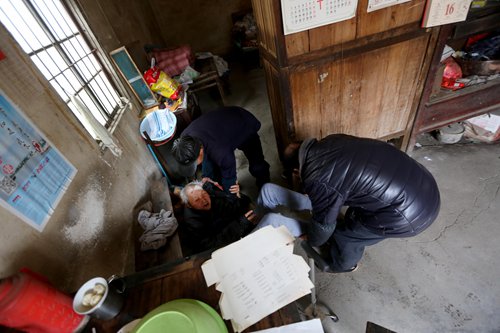
Pan helps a handicapped elderly man.
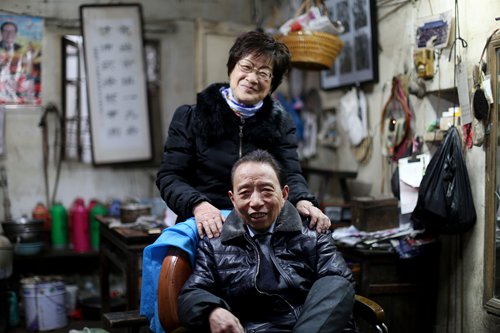
Pan and his wife
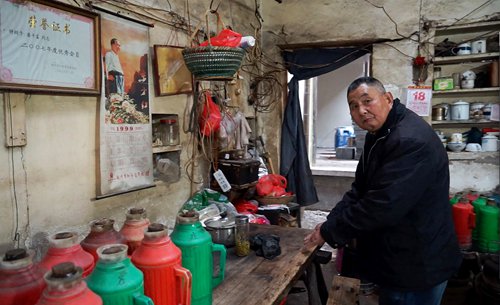
Pan's 66-year-old deaf assistant Zhang Qingsong
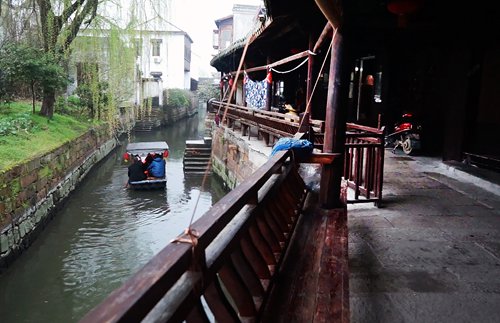
The river outside the teahouse
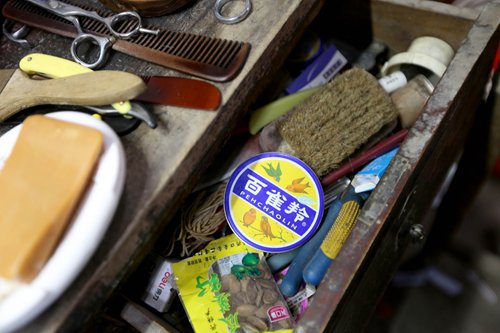
An old Chinese brand skincare product and other tools of the barber's trade
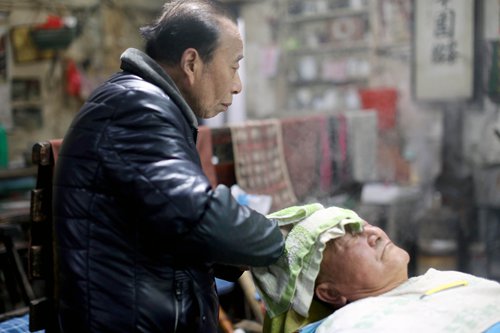
Pan trims a customer's hair.

